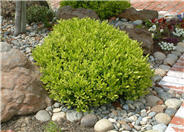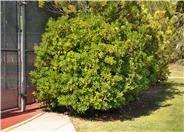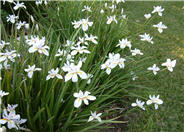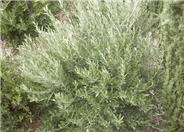
Common name:Wheeler's Dwarf Pittosporum
Botanical name:Pittosporum tobira 'Wheeler's Dwarf'
This handsome dwarf form of the Pittosporum tobira grows into a low, dense mound that is covered with glossy, evergreen foliage.

Common name:Blackstem Pittosporum, Tawhiwhi
Botanical name:Pittosporum tenuifolium
This medium sized evergreen shrub has medium green leaves with black stems. Its pleasing texture and narrow, upright growth make this a fine hedge or screen. It is easy to grow in soils with good drainage. Many new cultivars are being introduced with smaller, variegated and/or multi-colored foliage.

Common name:Butterfly-Iris, Fortnight Lily
Botanical name:Dietes iridioides
This clumping evergreen Iris bears tall, narrow leaves to 30" tall and white flowers marked purple in the center on stalks up to 3' tall. This variety has stiffer, darker foliage than the bicolor form. It requires sun to part shade with little or no summer watering when established. -Monterey Bay Nursery

Common name:Little Ollie Dwarf Olive
Botanical name:Olea europaea 'Little Ollie'
This evergreen shrub will grow to 8' tall and wide. It doesn't produce any fruit. It will do well in hot dry areas but can also survive in coastal areas. It has a compact round habit making it great for borders. It can be used for bonsai. It prefers well draining soil and is drought tolerant once it's established.
| Designer: | Grand Entrance |
Photographer: GardenSoft |
Soils and Compost:
Incorporate compost 6" into your soil to retain water, reduce compaction, feed earthworms, and provide valuable nutrients to your plants.
Water Saving Tip:
Apply as little fertilizer as possible.
If you use fertilizer make sure it stays on the landscape, and carefully water it in so there is NO runoff.
Integrated Pest Management:
Attract, or buy beneficial insects such as ladybugs and lacewings to control pest outbreaks in your garden.
